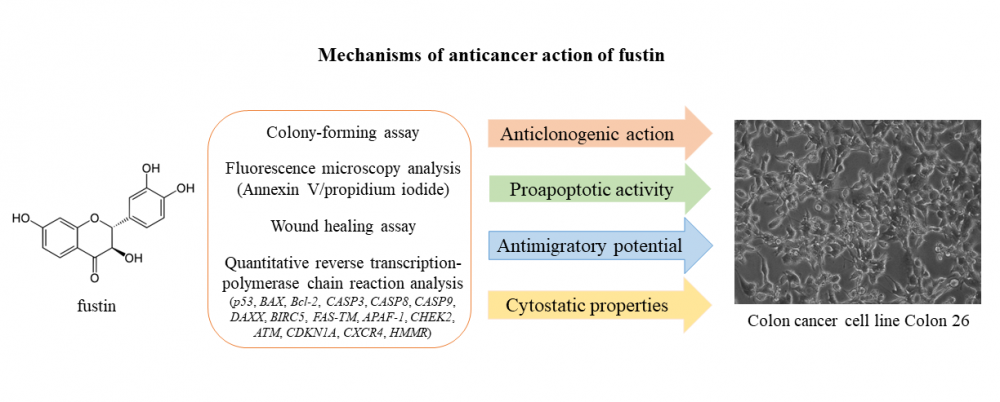JOURNAL 3070
Records of Agricultural and Food Chemistry
Year: 2024 Issue: 3 Special Issue: Abstracts 3rd. TCS, International Food Chemistry Congress February 29-March 03,2024 Antalya Türkiye
p.58 - 58
Viewed 1412 times.
-
Georgi Antov

-
Zlatina Gospodinova

-
Danail Pavlov

-
Miroslav Novakovic

-
Vele Tešević

-
Natalia Krasteva

-
Stefka Valcheva-Kuzmanova

GRAPHICAL ABSTRACT

ABSTRACT
Colon cancer is among the most common and lethal cancer types worldwide. The disease is very heterogeneous and is attributed to the accumulation of genetic and epigenetic alterations affecting specific genes involved in the regulation of cell growth, proliferation, adhesion, and survival. About 20% of patients with colon cancer are diagnosed with distant metastases which is associated with worse prognosis and survival. The search for novel natural therapeutic agents with higher effectiveness against the diseases, and milder side effects is of great interest in oncopharmacology. Medicinal plants represents valuable source of biologically active compounds with a wide range of pharmacological activities. Our previous study detected antiproliferative properties of fustin isolated from the heartwood of Cotinus coggygria Scop. against the highly metastatic colon cancer cell line Colon 26 [1]. The aim of the present work was to investigate some of the molecular mechanisms underlying the anticancer properties of fustin in colon cancer cells. For this purpose, we applied clonogenic assay to evaluate single cell capability to form a colony, fluorescence microscopy analysis after staining with Annexin V/propidium iodide to assess the proapoptotic properties of the flavonoid, wound healing assay to study antimigratory potential of fustin and quantitative reverse transcription-polymerase chain reaction analysis of the relative expression levels of genes associated with the cell cycle control, programmed cell death, and metastasis. The obtained results revealed that fustin significantly suppressed the colony-forming potential of Colon 26 cells after treatment for a period of 7 days, induced early and late apoptotic events in cancer cells and considerably inhibited cellular migratory properties, with a statistically significant decrease in cell motility compared to the untreated control observed at the 72nd hour of treatment. Transcriptional analysis of gene expression supplied information on some molecular pathways of the anticancer action of fustin and provided directions for future more detailed research.
KEYWORDS- Fustin
- Cotinus coggygria Scop
- colon cancer cell line
- anticancer activity